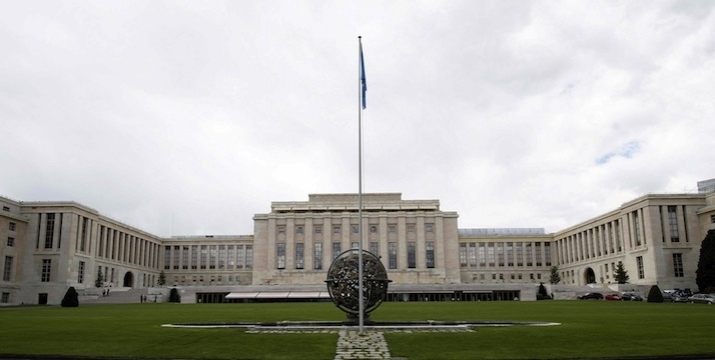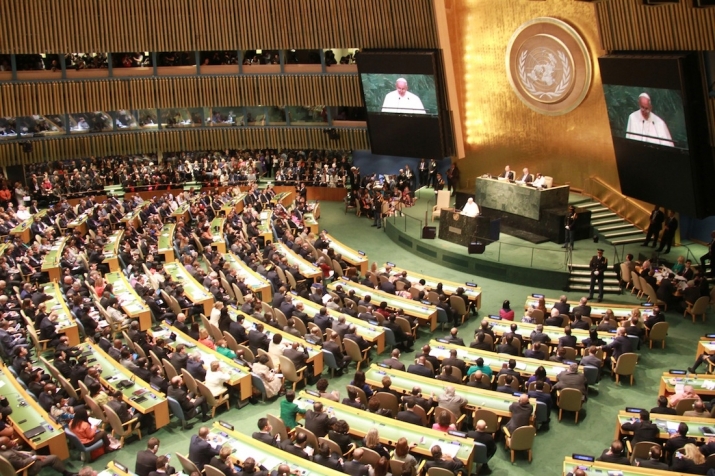FEATURES|THEMES|Commentary
Buddhistdoor View: The UN and Buddhist NGOs—Untested Partnerships
 The offices of the United Nations in Geneva. From webtv.un.org
The offices of the United Nations in Geneva. From webtv.un.orgNext month, Paris will host the 21st session of the Conference of the Parties (COP21) to the UN Framework Convention on Climate Change (UNFCCC), with the objective of negotiating policies that will keep the global temperature increase to below 1.5 degrees Celsius relative to pre-industrial levels. As of this year, the global temperature increase relative to pre-industrial levels was 0.8 degrees Celsius, and in November 2014 The World Bank warned in a report: “ . . . warming of close to 1.5°C above pre-industrial times is already locked into Earth’s atmospheric system by past and predicted greenhouse gas emissions. Without concerted action to reduce emissions, the planet is on pace for 2°C warming by mid-century and 4°C or more by the time today’s teenagers are in their 80s.”
A rise above 1.5 degrees Celsius would almost certainly herald catastrophic changes to global weather patterns and wreak irreversible damage to the delicate balance of ecological systems. Drought, famine, flooding, migration, air pollution, and conflict are all interlinked consequences of climate change, not to mention the millions of animal species and populations that have disappeared. In November this year, another World Bank report warned that the consequences of climate change would lead to mass poverty for 100 million people by 2030 if nothing is done.
The Paris summit is unique for the presence of the combined voices of the world’s religions demanding that global leaders act decisively to address the man-made threat to our planet. A number of landmark public statements have been directed at world leaders attending the conference, representing the concerns of billions of people of faith. Earlier this year, on 24 May, Pope Francis formally launched an attack on climate change with his encyclical Laudato Si’: On Care for Our Common Home. The Islamic Declaration on Climate Change followed shortly thereafter. On the Buddhist front, the Buddhist Climate Change Statement to World Leaders, signed on 28 October, united 15 of the most eminent figures in the Buddhist world to call for decisive action on climate change. The upcoming Hindu Declaration on Climate Change will lend a similar moral authority to the growing chorus of concern. Never before has such a shared urgency been expressed by religions on this core matter—neither at Kyoto in 1997, nor at Copenhagen in 2009.
While it is critical that the Buddhist climate change statement is presented at the summit, along with those from other faiths, there is also genuine concern among the statement’s authors as to the concrete steps Buddhists can take for themselves. However, we are too diffuse a tradition and can therefore often only act locally rather than implement global action. Working with the UN could be the step needed to amplify the voice of the Buddhist world on the global stage.
Faith-based NGOs are treated no differently from secular ones at the UN, and work formally through meetings, submitting speeches or documents, or attending subsidiary conferences. They also work informally through networking, lobbying, and private advocacy. Article 71 of the UN Charter guarantees UN consultation with NGOs through one of its main organs, the Economic and Social Council (ECOSOC). In return, NGOs need to register with the ECOSOC to obtain consultative status. Currently there are three types of status: “General,” for large international NGOs broadly representing major segments of society in a large number of countries globally; “Special,” for smaller groups with limited but specialty foci; and “Roster,” for those with an interest in occasional, technical contributions to the ECOSOC.
A 2014 study by Professor Jeremy Carrette of the University of Kent’s Department of Religious Studies concluded that at present, more than 70 per cent of faith-based NGOs at the UN are Christian. The Vatican also enjoys permanent observer status in the General Assembly as a city state (along with the array of Catholic NGOs with consultative status). Islamic NGOs are less conspicuous, but Muslim lobbying is a powerful force because Islamic interests tend to be represented through state organs, from the oil lobby to social conservative causes. In contrast, Carrette’s study found that Hinduism and Buddhism are chronically under-represented. A lack of state and private funding for these religions’ NGOs to sustain operations and staffing at the UN remains the prime factor in limiting equal access.
This presents Buddhists concerned about climate change with an uncomfortable yet likely scenario: if the UN and Buddhist institutions have so few points of interaction, the likelihood of collaboration to implement the goals of COP21 seems remote. It might be argued, therefore, that the regional sanghas, who now have the backing of 15 senior Buddhists via the statement calling for action on climate change, are in a better position to act locally without UN involvement.
 Pope Francis addresses the UN General Assembly in New York on 25 September 2015. From news24extra.com
Pope Francis addresses the UN General Assembly in New York on 25 September 2015. From news24extra.comThere are two main arguments for pursuing greater Buddhist participation at the UN. The first is that our under-representation is reason in itself to try to correct the imbalance. To Buddhism’s detriment, the preponderance of theistic NGOs at the UN means that Christian, Jewish, and Islamic concerns are being lobbied for and considered at a global level while Buddhist ideas are not. An increased Buddhist presence would not only enhance UN legitimacy in the eyes of Buddhists, but would also give Buddhists greater scope to contribute to the various targets set by UN bodies (such as the Millennium Development Goals and the Sustainable Development Goals), which are unlikely to be achieved without local participation.
Secondly, there is the prospect of real returns on investing in Buddhist advocacy. Carrette’s study found that religious NGOs in total form only 7.29 per cent of “consultative status” NGOs, yet punch far above their weight in terms of lobbying access with UN officials. Specifically, Baha’i International, Caritas International, and The Centre for Social Research enjoy at least weekly meetings with diplomats, a frequency of contact that exceeds that of non-religious NGOs altogether. From this perspective, Buddhist representation in New York or Geneva becomes all the more important because meetings with UN diplomats would provide those diplomats with greater insight and information about events and initiatives on the ground in Buddhist (and by extension, Asian) regions. A greater presence of Buddhist NGOs in the UN would also mean that the UN could work more frequently and sensitively with Buddhist groups to coordinate environment and climate change issues.
While Buddhist NGOs need to show the UN that they are serious about engaging with global issues, the UN should also reach out to the Buddhist groups that have already done so, ever mindful that if its blessing is only symbolic, Buddhists will be unable to see the need for practical UN involvement in their communities (hence the vicious cycle of Buddhist absence at the UN and the UN’s apparent indifference). Also, Buddhist groups might find it difficult to secure funding specifically for UN-related projects because this could depend on state government support, and the goals of the UN and the individual concerns of governments are notoriously and frequently out of sync. Local Buddhist communities might prefer working with regional Buddhist power-brokers like the International Buddhist Confederation (IBC) in Asia. It is therefore likely that most Buddhist NGOs (many of which come from developing economies) have little time or interest to gain access to the ECOSOC. The countries of the Buddhist world need to make it easier for their NGOs to access cash and funding, but those NGOs should also be more proactive in interfacing with the UN.
Even if no Buddhists send their advocates to Paris in December, the renewed urgency of climate change might inspire some to do so at other points in the UN schedule. It is also for the UN, where feasible, to contact the statement’s signatories. It could even enquire how they might collaborate on the great matters of our time apart from climate change, such as conservation and the UN’s development goals. The door has been opened through the statement, and both NGOs and the UN should seize this chance to foster a new and unique Buddhist-UN relationship.
See more
World Is Locked into About 1.5°C Warming & Risks Are Rising, New Climate Report Finds (The World Bank)
Rapid, Climate-Informed Development Needed to Keep Climate Change from Pushing More than 100 Million People into Poverty by 2030 (The World Bank)
Top Buddhists Sign Landmark Statement on Climate Change to Global Leaders (Buddhistdoor Global)
Buddhist Climate Change Statement to World Leaders 2015














